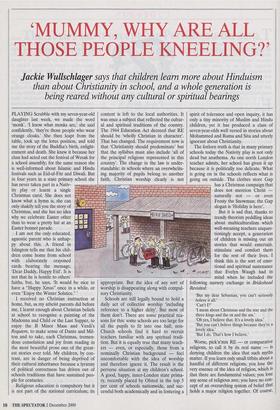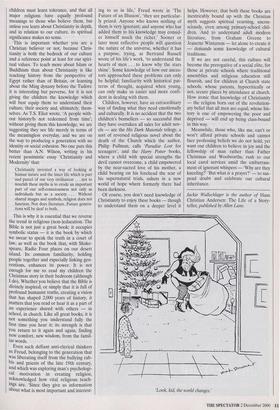'MUMMY, WHY ARE ALL THOSE PEOPLE KNEELING?'
Jackie Wullschlager says that children learn more about Hinduism
than about Christianity in school, and a whole generation is being reared without any cultural or spiritual bearings
PLAYING Scrabble with my seven-year-old daughter last week, we made the word 'monk'. 'I know what monks are,' she said confidently, 'they're those people who wear orange cloaks.' She then leapt from the table, took up the lotus position, and told me the story of the Buddha's birth, enlight- enment and death. She knew it because her class had acted out the festival of Wesak for a school assembly; for the same reason she is well-informed about Islamic and Hindu festivals such as Eid-ul-Fitr and Diwali. But in four years in a state primary school she has never taken part in a Nativ- ity play or learnt a single Christmas carol. She does not know what a hymn is, she can only shakily tell you the story of Christmas, and she has no idea why we celebrate Easter other than to wear a pretty hat at an Easter bonnet parade.
I am not the only educated, agnostic parent who is unhap- py about this. A friend in Islington tells me that his chil- dren come home from school with elaborately crayoned cards bearing the message, 'Dear Daddy, Happy Eid'. It is not that he is hostile to others' faiths, but, he says, 'It would be nice to have a "Happy Xmas" once in a while, or even "Enjoy the Winter Solstice."' I received no Christian instruction at home, but, as my atheist parents did before me, I learnt enough about Christian beliefs at school to recognise a painting of the Madonna and Child or the Last Supper, to enjoy the B Minor Mass and Verdi's Requiem, to make sense of Dante and Mil- ton and to take, each Christmas, tremen- dous consolation and joy from reading in the most beautiful prose one of the great- est stories ever told. My children, by con- trast, are in danger of being deprived of their cultural inheritance because a tyranny of political correctness has driven out of schools traditions that have sustained peo- ple for centuries.
Religious education is compulsory but it is not part of the national curriculum; its
11
• • 2 'Agi ri GI • ri •••111M content is left to the local authorities. It was once a subject that reflected the cultur- al and spiritual traditions of the country. The 1944 Education Act decreed that RE should be 'wholly Christian in character'. That has changed. The requirement now is that 'Christianity should predominate' but that the syllabus must also include 'all of the principal religions represented in this country'. The change in the law is under- standable: in schools where an overwhelm- ing majority of pupils belong to another faith, Christian worship clearly is not appropriate. But the idea of any sort of worship is disappearing along with compul- sory Christianity.
Schools are still legally bound to hold a daily act of collective worship 'including reference to a higher• deity'. But most of them don't. There are some practical rea- sons for this: some schools are too large for all the pupils to fit into one hall; non- Church schools find it hard to recruit teachers familiar with any spiritual tradi- tion. But it is equally true that many teach- ers — even, or especially, those from a nominally Christian background — feel uncomfortable with the idea of worship and therefore ignore it. The result is the perverse situation at my children's school. A good, happy, inner-London state prima- ry, recently placed by Ofsted in the top 5 per cent of schools nationwide, and suc- cessful both academically and in fostering a spirit of tolerance and open inquiry, it has only a tiny minority of Muslim and Hindu children, yet it has produced a class of seven-year-olds well versed in stories about Mohammed and Rama and Sita and utterly ignorant about Christianity.
The forlorn truth is that in many primary schools today the Nativity play is not only dead but anathema. As one north London teacher admits, her school has given it up because it is politically too delicate. What is going on in the schools reflects what is going on outside. The clothes store Gap has a Christmas campaign that does not mention Christ — naturally not — or even Frosty the Snowman; the Gap slogan is 'Holiday is here'.
But it is sad that, thanks to trendy theorists peddling ideas about multiculturalism which well-meaning teachers unques- tioningly accept, a generation of children is missing out on stories that would entertain, stimulate and comfort them for the rest of their lives. I think this is the sort of emo- tional and spiritual sustenance that Evelyn Waugh had in mind when he included the following nursery exchange in Brideshead Revisited:
'But my dear Sebastian, you can't seriously believe it all.'
'Can't I?'
'I mean about Christmas and the star and the three kings and the ox and the ass.'
'Oh yes, I believe that. It's a lovely idea.'
'But you can't believe things because they're a lovely idea.'
'But I do. That's how I believe.'
Worse, pick'n'mix RE — or comparative religions, to call it by its real name — is denying children the idea that such myths matter. If you learn only small titbits about a handful of different religions, you lose the very essence of the idea of religion, which is that there are fundamental values; you lose any sense of religious awe; you have no con- cept of an overarching system of belief that holds a major religion together. Of course, children must learn tolerance, and that all major religions have equally profound meanings to those who believe them, but unless you learn about Christianity in depth, and in relation to our culture, its spiritual significance makes no sense.
This is important whether you are a Christian believer or not, because Chris- tianity is both the bedrock of our culture and a reference point at least for our spiri- tual values. To teach more about Islam or Buddhism than about Christianity is like teaching history from the perspective of Egypt rather than of Britain, or learning about the Ming dynasty before the Tudors: it is interesting but perverse, for it is not giving the children the knowledge which will best equip them to understand their culture, their society and, ultimately, them- selves. As T.S. Eliot wrote, 'A people with- out history/Is not redeemed from time'; without giving them this knowledge, we are suggesting they see life merely in terms of the meaningless everyday, and we are on the way to producing a generation with no identity or social cohesion. No one puts this better than A.N. Wilson, writing in his recent pessimistic essay 'Christianity and Modernity' that:
Christianity invented a way of looking at human nature and the inner life which is part and parcel of our very civilisation . . . not to nourish these myths is to erode an important part of our self-consciousness not only as individuals but as a society. . . . Without shared images and symbols, religion does not function. Nor does literature. Future genera- tions will be deaf to both.
This is why it is essential that we reverse the trend in religious (non-)education. The Bible is not just a great book; it occupies symbolic status — it is the book by which we swear to speak the truth in a court of law, as well as the book that, with Shake- speare, Radio Four places on our desert island. Its common familiarity, holding people together and especially linking gen- erations, enhances its power. It is not enough for me to read my children the Christmas story in their bedroom (although I do). Whether you believe that the Bible is divinely inspired, or simply that it is full of profound humanist truths, creating a vision that has shaped 2,000 years of history, it matters that you read or hear it as a part of an experience shared with others — in school, in church. Like all great books, it is not something you understand fully the first time you hear it; its strength is that YOU return to it again and again, finding new comfort, new wisdom, from the famil- iar words.
Even such defiant anti-clerical thinkers as Freud, belonging to the generation that was liberating itself from the bullying rab- bis and priests of the late 19th century, and which was exploring man's psychologi- cal motivation in creating religion, acknowledged how vital religious teach- ings are. 'Since they give us information about what is most important and interest- ing to us in life,' Freud wrote in 'The Future of an Illusion', 'they are particular- ly prized. Anyone who knows nothing of them is very ignorant; and anyone who has added them to his knowledge may consid- er himself much the richer.' Sooner or later most reflective people will question the nature of the universe, whether it has a purpose, trying, as Bertrand Russell wrote of his life's work, 'to understand the hearts of men . . . to know why the stars shine'. Some knowledge of how our ances- tors approached these problems can only be helpful; familiarity with historical pat- terns of thought, acquired when young, can only make us easier and more confi- dent in dealing with them.
Children, however, have an extraordinary way of finding what they need emotionally and culturally. It is no accident that the two children's bestsellers — so successful that they have overtaken all sales for adult nov- els — are the His Dark Materials trilogy, a sort of reversed religious novel about the death of the Church which the author, Philip Pullman, calls 'Paradise Lost for teenagers', and the Harry Potter books, where a child with special strengths the devil cannot overcome, a child empowered by the near-sacred love of his mother, a child bearing on his forehead the scar of his supernatural trials, ushers in a new world of hope where formerly there had been darkness.
Of course, you don't need knowledge of Christianity to enjoy these books — though to understand them on a deeper level it helps. However, that both these books are inextricably bound up with the Christian myth suggests spiritual yearning, uncon- sciously, even among primary-school chil- dren. And to understand adult modern literature, from Graham Greene to Jeanette Winterson — let alone to create it — demands some knowledge of cultural traditions.
If we are not careful, this culture will become the prerogative of a social elite, for those at private schools where traditional assemblies and religious education still flourish, and for children at Church state schools, whose parents, hypocritically or not, secure places by attendance at church. How ironic that knowledge of Christianity — the religion born out of the revolution- ary belief that all men are equal, whose his- tory is one of empowering the poor and deprived — will end up being class-bound in this way.
Meanwhile, those who, like me, can't or won't afford private schools and cannot face professing beliefs we do not hold, yet want our children to believe in joy and the fellowship of man rather than Father Christmas and Woolworths, rush to our local carol services amid the embarrass- ment of ignorant whispers — 'Why are they kneeling?' But what is a prayer?' — to sus- pend doubt and celebrate our cultural inheritance.
Jackie Wullschlager is the author of Hans Christian Andersen: The Life of a Story- teller, published by Allen Lane.



















































































 Previous page
Previous page